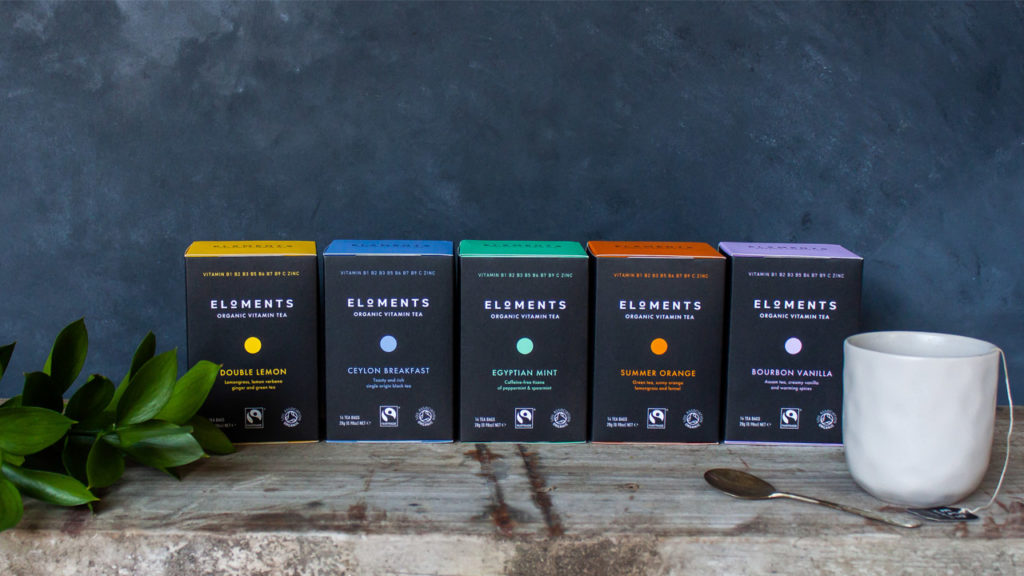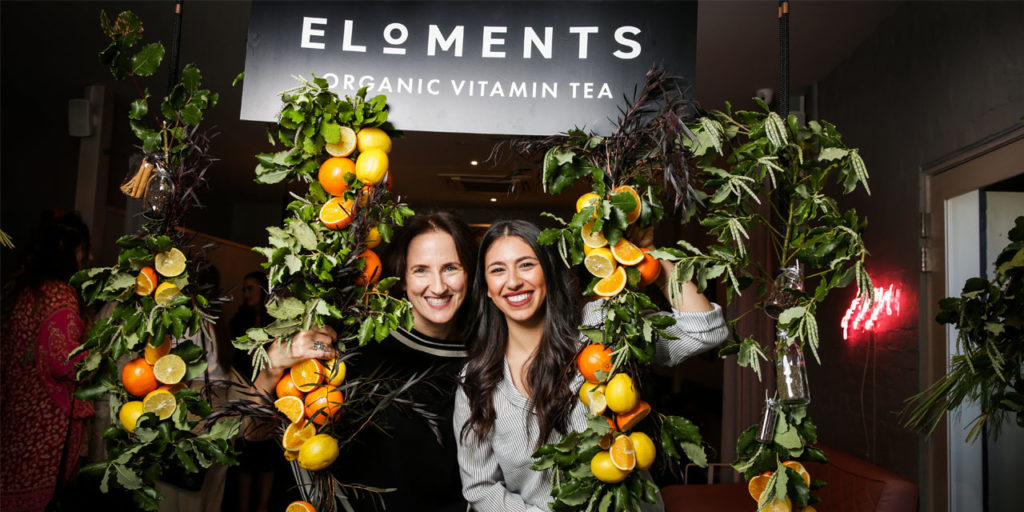Fairtrade Foundation’s Catherine Rubbens, Senior Partnerships Manager, sits down with Julie Hirsch, Co-founder and Chief Operating Officer of the Fairtrade-certified Eloments Tea, to discuss her recipe for success.
Eloments Organic Vitamin Tea is the world’s first 100% natural vitamin tea, and it’s also 100% Fairtrade. It was the brainchild of two entrepreneurs, Julie Hirsch and Nicole Lamond, who were inspired to create Eloments after struggling to find time to stay healthy due to their busy, professional lifestyles. (Nicole was a founding board member of Fairtrade Australia, while Julie was deputy director of an environmental non-profit organisation). They didn’t like the idea of popping vitamin tablets, so devised a delicious alternative to get their daily dose of nutrients: vitamin tea.
Since its launch in September 2018, Eloments is now sold in over 1,000 stores and available in the UK, through Holland & Barrett, and in Australia and Finland. The brand has been received with enthusiasm from retailers and consumers alike. We wanted to hear their tips for brewing up a successful Fairtrade brand, so we put some questions to Julie, who was the 2020 Telstra Business Woman of the Year for Victoria, Australia, and part of the Forbes 30 Under 30 list for Asia in 2020.
1. Dare to be disruptive
Catherine: There’s been a lot of excitement about Eloments. What’s behind it?
Julie: ‘When we launched Eloments, we knew that innovation was going to be essential for cut-through in an established category. We launched a 100% natural, organic product that blended natural vitamins with Fairtrade tea – a whole new concept. Our USP [unique selling point] is ‘natural vitamins in your daily cup of tea’. Because of our innovation, we received immediate interest from retailers and consumers, in spite of us being so new to the market.’
2. Be authentic
How has Eloments succeeded in turning ethical credentials into a brand asset?
‘We have focused on authenticity from the start. It is all about connecting at the kitchen table over a cup of tea. ‘Word-of-mouth’ is really important to us, and social media is a great platform to build the relationships that drive this. For example, the wonderful producer stories that we can draw on from being Fairtrade present a great way to connect with our tea lovers and give them the confidence that they’re building a better world with every cup of tea they drink.’
3. Tap into the power of younger generations
What’s your experience in engaging with younger generations? How are they different and what motivates them?
‘From our research, we know that Gen Z are more likely to drink tea than coffee and that they have very little tolerance for brands who are leaving the world worse-off. Younger shoppers are beginning to become conscious of their power to influence the system.’
4. Reward consumers who care about their wellbeing and the world’s wellbeing
Recent figures confirm that ethical consumerism is on the rise, in spite of the pandemic. Is this something you’ve seen in your business?
‘In 2017 I was meeting with the General Manager of a Fairtrade co-operative in Sri Lanka. While discussing climate change he said to me: “I can’t tell someone in London ‘you can’t have your cup of tea today because our farms are being impacted’.’’ Yet during the pandemic, consumers have been confronted with empty shelves, a reality that many had never faced in their lives. I believe this led many to reflect on where their goods are coming from, and brought the supply chain and the people who are making the products to the front of their minds.’
Is there a correlation between people who care about personal health and wellness and people who care about the sustainability or ethical sourcing credentials of brands they use?
‘We often say that Eloments was created “for people who care about their wellbeing and the wellbeing of the world”. We’ve found, in our customers, that people who care about their health and wellness tend to have thought deeply about what they consume. The same people want to know without a shadow of a doubt how their consumption impacts on people and the environment. For example, they will ask questions about any harmful pesticides in their products, both to ensure they are not consuming them, but also to know that their consumption has not impacted the land and farmers who have grown their favourite product.’
5. Make your product Fairtrade
Why is Fairtrade so important for Eloments?
‘Fair wages for workers in our supply chain was fundamental for Nicole and me when we started the business. We reviewed all existing labels carefully, and Fairtrade came out as the most credible and holistic one. It’s the Standard we have decided to hold ourselves to, as it covers both environmental and social aspects. Paying a decent income to producers is fundamental and often overlooked in sustainability, because environmental protection goes hand-in-hand with producers’ ability to make sustainability investments. Fairtrade also helps us talk to consumers. It increases their trust, adds to our authenticity and makes it easy for people to promote our products.’
6. Engage with mainstream consumers
Supply chain challenges, like the issue of low wages, can be complicated to explain to consumers. How does Eloments go about this?
‘We wanted our products to be mainstream from the beginning. Fairtrade makes our products slightly more expensive because it allows us to pay workers in our supply chain a living wage and has robust auditing requirements. But the added value when it comes to marketing compensates for this. We want to do business with retailers with an interest in innovation and ethics, which is the path we are pursuing.’
7. Use the digital space for storytelling
We operate in a digital world and e-commerce is becoming increasingly important. Do you have any tips on how to make ethical products more visible in this environment?
‘The digital space is a great equaliser and an excellent platform for storytelling. Social media helps us tell wonderful stories in a way that is almost as powerful as talking face-to-face over a cup of tea. Just remember that the digital space is not limited to Facebook and Instagram. There’s LinkedIn, which has been great for organic reach to tell the behind-the-scenes business stories of a Fairtrade startup. There’s TikTok, Clubhouse, Pinterest and many more that host niche but loyal audiences. It’s hard not to love a brand that’s trying to build a fairer world when you get to interact with them directly, even if it is digitally.’
Visit Eloments’ online shop to try their delicious teas
Buy Eloments tea from Holland & Barrett

